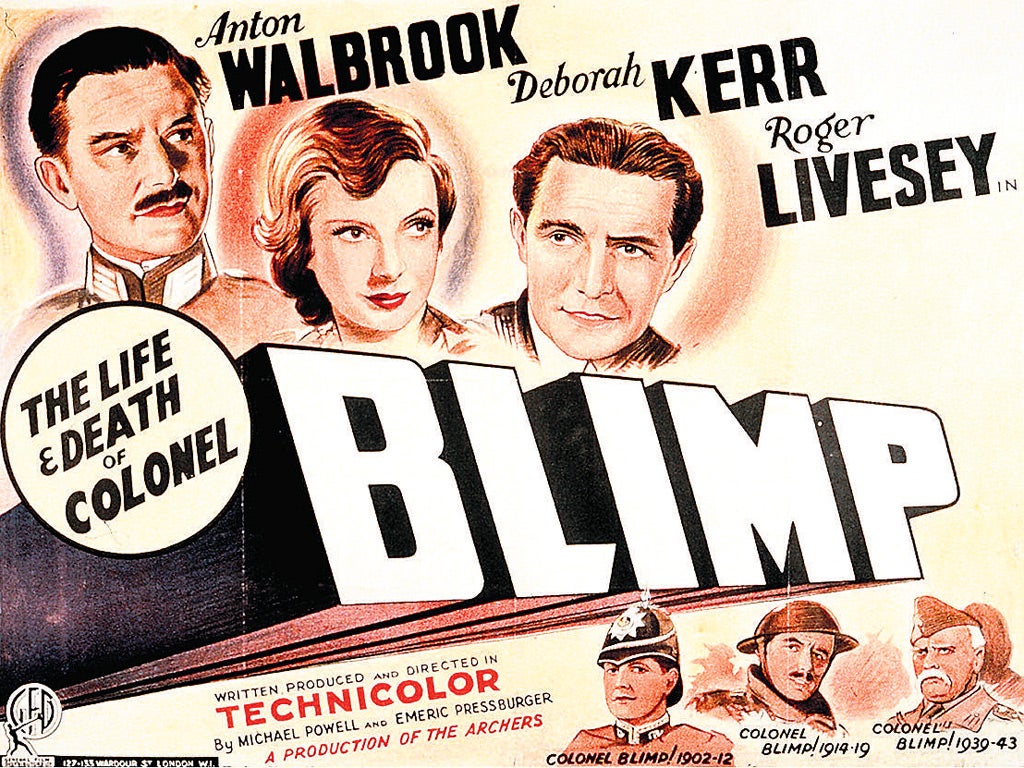Colonel Blimp: The masterpiece Churchill hated
Powell and Pressburger's jingoistic film was maligned, then mutilated. But, says Geoffrey Macnab, its genius survives

Winston Churchill hated the idea of The Life and Death of Colonel Blimp (1943). The then-Prime Minister couldn't understand why, in the middle of the Second World War, Michael Powell and Emeric Pressburger were making a film that included a sympathetic German. Others were baffled that one of Britain's pre-eminent film-making teams was telling the story of a a fat, walrus-moustached, jingoist character originating in David Low's cartoons in the Daily Express.
"Don't make it, because everyone will be really cross, and the Old Man will be very cross and you'll never get a knighthood," Powell was warned by the Ministry of Information. Powell did make the film – and he didn't get the knighthood. Pressburger was crestfallen to have provoked Churchill's ire.
Blimp was cut severely before its US release. The elaborate flashback structure was taken out and the film was presented as a rip-roaring adventure. Nonetheless, earlier this week at BFI Southbank, when a restored version was introduced by Martin Scorsese and his editor Thelma Schoonmaker-Powell, widow of Michael Powell, there was an absolute consensus that this was one of the greatest British films of all – and one of the most perceptive about national identity.
"Every time I revisit The Life and Death of Colonel Blimp, it seems to have become more resonant, more moving, more profound," Scorsese said. "You could say it's the epic of an ordinary life. And what you retain from this epic is an overpowering sense of warmth and love and friendship, of shared humour and tenderness, and a lasting impression of the most eloquent sadness."
The film is indeed a very deceptive affair – a wartime propaganda movie that owes as much to Proust as it does to the Ministry of Information; an action drama that is really a story about love and friendship, and growing old. At the beginning of the film, the elderly Blimp (Roger Livesey) is caught out in a Turkish bath. He is supposed to be taking part in a military exercise. The steam rises as Blimp rages but the soldier arresting him is contemptuous of "the national sporting-club rules" that the old man fights wars by.
In these scenes, Blimp seems the buffoon that fans of Low's cartoon must have expected. However, we flash back to 40 years earlier in the hero's military career. The two key elements of the story are established: Blimp's friendship with the German officer Theo (Anton Walbrook) that will span three wars (the Boer, the First and the Second World Wars) and his romantic longing for the "girl" (three different characters, all played by Deborah Kerr). The genius of Pressburger's screenplay is that it takes stock types – a priggish British officer and his arrogant German counterpart – and gives them depth and humanity.
Powell was a quintessentially English director who surrounded himself with foreign collaborators. "It's a 100 per cent British film but it's photographed by a Frenchman, it's written by a Hungarian, the musical score is by a German Jew, the director was English, the man who did the costumes was a Czech; in other words, it was the kind of film that I've always worked on with a mixed crew of every nationality, no frontiers of any kind," he claimed of Blimp.
"Pray propose to me the measures to stop this foolish production," Churchill wrote when the film was about to go into production. Scorsese and all lovers of British film will be forever thankful that this was one occasion on which he was thwarted.
Join our commenting forum
Join thought-provoking conversations, follow other Independent readers and see their replies
Comments
Bookmark popover
Removed from bookmarks